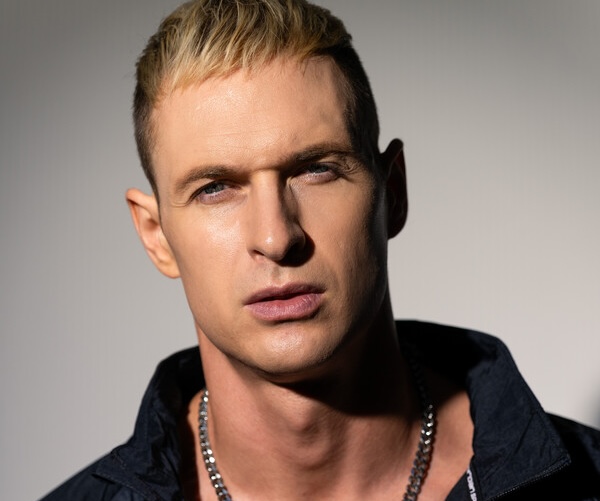(Translated from Korean)
Yoon Kyung-min: The brand KPOP KRACKED—I understand K-pop, but KPOP KRACKED sounds unfamiliar. What is it?
Fenner: KRACKED comes from the phrase “cracked the code,” like decoding Morse code during World War II. In the case of KPOP KRACKED, it means decoding K-pop in order to introduce and expand it into global EDM festivals and clubs. I’ve loved the sound and energy of various forms of EDM that I’ve worked with for the past 24 years. So I combine K-pop with EDM to create something new. Because I’ve played EDM at festivals, I know what works. By KPOP KRACKED, I mean transforming or remixing K-pop with electronic dance music, while keeping its unique flavor but twisting it into something more exciting and stylish. It’s my own genre.
Q: What’s the characteristic of KPOP KRACKED?
A: I think the essence of K-pop is beautiful and good, but sometimes on big festival stages the energy feels lacking. Pop tends to be like that. So KPOP KRACKED combines the beautiful vocals of K-pop with melodies of famous existing songs, strong beats, and high energy. In the end, it breathes energy into K-pop. And when I play music, I project K-pop music videos that are copyright-free with colorful filters onto a large screen simultaneously. So the audience hears the music while also seeing idols dance and sing.
Q: So basically it’s a mix of K-pop and EDM. I think I get it, but not fully.
A: Let me put it this way. K-pop has grown into a global phenomenon with its cute pop atmosphere, catchy vocals, intricate and stylish choreography, and vivid visuals. But as the genre keeps expanding, the desire to innovate and push its boundaries grows. KPOP KRACKED is an exciting project that fuses EDM’s energetic beats and the world’s most famous melodies with K-pop’s unique signature style, giving fans a completely new experience. Led by me, DJ Fenner, who has more than 15 years of experience in Korea and over 24 years worldwide, KPOP KRACKED is redefining how K-pop is experienced both sonically and visually.
Q: You’ve described K-pop’s charm as cute pop atmosphere, catchy vocals, stylish dance, and vivid visuals. Specifically, what do you think makes today’s K-pop shake the world?
A: There are many reasons. Beyond the music itself, beauty and fashion are a big part of its success. The internet and agencies’ marketing power is huge. Entertainment companies are excellent at managing idols’ brands and images. The popularity of TikTok and Reels aligns perfectly with K-pop dance trends, giving fans more ways to interact with idol groups, like through dance challenges. Honestly, K-pop idols are all handsome and beautiful. Looks matter. Their style is great—the clothes, hair, and makeup are trendy and on point.
Q: So Korean idols’ looks are considered very appealing?
A: Absolutely. They’re beautiful. Nationality or background doesn’t matter. Whether from Europe, Africa, South America, or Asia, people recognize good DNA. Statistically, Koreans are among the tallest in Asia, too.
Q: Aside from appearance, what else makes K-pop appealing?
A: So many things! First, they’re great dancers. The coordinated group choreography, the sharp synchronization—it’s breathtaking. This kind of act didn’t really exist in other countries before. Where else but K-pop do you see such polished and spectacular group dancing?
Q: Michael Jackson also became a global sensation with breakdancing. Koreans loved him, too.
A: But Michael Jackson was alone—a solo artist. Groups that showed such dazzling choreography didn’t exist before K-pop idols.
Q: So will the current popularity of K-pop continue, or will it decline?
A: I think it will continue. Every trend burns brightly before it explodes. K-pop is the trend now—it’s just starting to explode. The timing is perfect. But I don’t think K-pop has reached its global peak yet.
Q: So you’re saying it still has room to grow?
A: It’s still growing. That’s why I don’t think it’s fully mainstream yet. In a few years, we’ll see Korean and global stars collaborating, sharing music styles and fandoms. Already, Rosé and Bruno Mars made the song “Apartment,” which gained popularity. That’s when K-pop simply becomes pop. So I believe it has more potential. Like a flower bud just beginning to bloom, it will open wider. I think K-pop’s competitiveness and unique style will continue for the time being. You’ll see K-pop idols adopting styles of foreign artists, and foreign artists imitating K-pop idols’ styles. That’s normal, healthy artistic exchange. Everyone inspires each other, and music evolves in cycles. Honestly, K-pop songs are sometimes written by top global songwriters or producers—what’s called “ghost production.” Songwriters from all over the world join song camps in Korea, write songs in English, and then they’re turned into Korean lyrics for K-pop idols to sing. International teams collaborate to raise the quality of the music.
Q: I heard you also combine traditional Korean music, pansori, with modern music?
A: Yes, recently at the Namsan Hanok Village Pansori Festival, I presented remixes. Chunhyangga, Simcheongga, “The Tiger is Coming Down”… I combined these with modern music with powerful beats. It gives a new feeling. I’ve also worked with the National Gugak Center.
Q: Would foreigners also enjoy Arirang or pansori remixes with beats?
A: Definitely possible. It’s unique. By combining something entirely new with familiar music, it can gain global recognition and love. Even I get excited when I listen to my own remixes. They’ve had good responses at local events. But to gain global popularity, it will take time, visuals, and strong marketing.
Q: It seems no one has really tried fusing Korean folk or pansori with strong beats before. It’s impressive that a British DJ is doing it.
A: Maybe someone tried, but not seriously. I just enjoy the idea of making traditional Korean music hot. If someone invests, I could help with everything. Haha. I believe the music has potential. But honestly, I need commissions to make a living.
Q: Will you continue fusing pansori and folk songs with EDM?
A: I enjoy creating fusion music and culture. In the UK, immigration shaped music in interesting ways. For example, Jamaica, once a colony, influenced British music through its immigrants. That fusion created synergy and progress. I think Korea can grow in the same way through cultural exchange with foreigners living here. People often overlook that. That’s why I believe it’s important to preserve and pass down Arirang, folk songs, and pansori like Chunhyangga in their traditional form, but also to fuse them with Western music to create new genres. This way, more people around the world can enjoy them, and interest in original Korean traditional music will grow naturally. I see this kind of fusion music as a gift to people.
Q: How do you see the future of KPOP KRACKED, and how are you planning it?
A: I dream of regular world tours. As a solo artist or with K-pop singers and dancers, as part of full concerts, festivals, or big club shows. Of course, because K-pop groups and idols are so famous and careful about brand management, convincing their companies to work with me in the early stages won’t be easy. But I’ll keep pushing the project, growing it, and touring globally as a solo artist first. Someday I hope to meet friends or business partners who understand my vision and connect me with the right people to make collaboration possible.
Yoon Kyung-min: We hope you spread Korean popular and traditional music more widely through your global tours. Thank you.
Original source of article in Korean by LG Hello TV News can be found here:
https://news.lghellovision.net/news/articleView.html?idxno=504165

